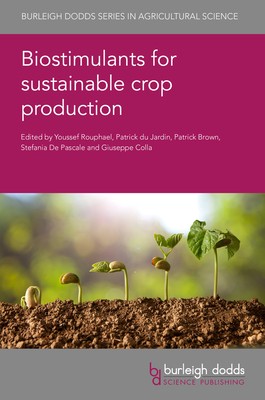
- We will send in 10–14 business days.
- Publisher: Burleigh Dodds Science Publishing Ltd
- ISBN-10: 1786763362
- ISBN-13: 9781786763365
- Format: 15.2 x 22.9 x 2.2 cm, kieti viršeliai
- Language: English
- SAVE -10% with code: EXTRA
Biostimulants for Sustainable Crop Production (e-book) (used book) | bookbook.eu
Reviews
Description
Biostimulants stimulate natural processes in crops to enhance nutrient uptake, nutrient use efficiency (NUE), resistance to abiotic stress and quality traits. They offer the opportunity to enhance fertilizer use and thus contribute to more sustainable crop production. This collection reviews key advances in understanding and using biostimulants.
Part 1 reviews ways of classifying biostimulants, types of bioactive compound and ways of evaluating biostimulants. Part 2 surveys the various types of biostimulant, from humic substances and seaweed extracts to protein hydrolysates, silicon, plant growth-promoting rhizobacteria (PGPR) and arbuscular mycorrhizal fungi (AMF). Part 3 discusses advances in designing second-generation biostimulants and their practical application in such areas as enhancing nutrient use efficiency (NUE).
EXTRA 10 % discount with code: EXTRA
The promotion ends in 22d.02:30:50
The discount code is valid when purchasing from 10 €. Discounts do not stack.
- Publisher: Burleigh Dodds Science Publishing Ltd
- ISBN-10: 1786763362
- ISBN-13: 9781786763365
- Format: 15.2 x 22.9 x 2.2 cm, kieti viršeliai
- Language: English English
Biostimulants stimulate natural processes in crops to enhance nutrient uptake, nutrient use efficiency (NUE), resistance to abiotic stress and quality traits. They offer the opportunity to enhance fertilizer use and thus contribute to more sustainable crop production. This collection reviews key advances in understanding and using biostimulants.
Part 1 reviews ways of classifying biostimulants, types of bioactive compound and ways of evaluating biostimulants. Part 2 surveys the various types of biostimulant, from humic substances and seaweed extracts to protein hydrolysates, silicon, plant growth-promoting rhizobacteria (PGPR) and arbuscular mycorrhizal fungi (AMF). Part 3 discusses advances in designing second-generation biostimulants and their practical application in such areas as enhancing nutrient use efficiency (NUE).


Reviews